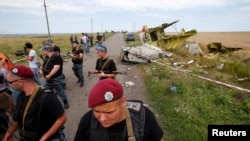Russian shares slid on Monday to a two-month low as Moscow came under fierce international pressure over the downing of Malaysia Airlines flight MH17 and European governments threatened to follow the United States in widening economic sanctions.
Monday's losses extended a near 8 percent slump last week provoked by Washington's imposition of sanctions on large Russian domestic companies, including oil major Rosneft which again fell sharply on Monday.
“There's no doubt that investors are uneasy - there are a lot of questions out there,” said Gazprombank strategist Erik DePoy. “It is an emotional time... the [airliner crash] has exacerbated tensions already there.”
Russian stocks are this year's worst performers among emerging markets, losing 12 percent in dollar terms compared with a 6 percent gain on the benchmark MSCI index as a whole.
At 1150 GMT, the dollar-denominated RTS index had fallen 2.15 percent to 1,249.9 points - down 9 percent since the beginning of last week.
The rouble-traded MICEX hit its lowest point since mid-May. It traded 2.1 percent lower at 1,393.3 points - down 7 percent since the start of last week.
The United States has presented what it says is overwhelming evidence of Russian complicity in the shooting down of the jet over eastern Ukraine last Thursday, and demanded President Vladimir Putin use his influence over pro-Moscow rebels who control the crash sites to allow international investigators free access.
Putin has blamed the Ukrainian military for the disaster, in which 298 people died, and said on Monday that everything must be done to guarantee the security of the international experts at the site.
Britain, Germany and France agreed at the weekend that they should be ready to ratchet up sanctions when European foreign ministers meet in Brussels on Tuesday.
Milder Falls
DePoy said the sell-off was an “across the board lightening of positions” but noted that the market had not fallen to the same degree as when the crisis first erupted with the fall of a pro-Russian president in Ukraine and Moscow's annexation of Crimea in March.
Companies targeted by last week's U.S. sanctions continued to fall. Rosneft was down nearly 2 percent in morning trading, bringing its fall since the beginning of last week to 7 percent. Gas producer Novatek, which was also slapped with U.S. sanctions, was down 1 percent, bringing its fall since the beginning of last week to nearly 8 percent.
The overall falls were bigger than those on overseas markets, where London's FTSE fell 0.2 percent on the day and the pan-European FTSEurofirst 300 fell 0.5 percent.
While hitting individual companies, the U.S. sanctions also make it more difficult for Russian companies to refinance existing international loans and has dashed hopes that the country's syndicated loan market is reopening.
The financial subindex on MICEX, a market capitalisation-weighted price index of Russia's top-tier and most liquid financial stocks, underperformed, traded 2.1 percent down on the day and losing nearly 9 percent since early last week.
Sberbank, Russia's largest lender was down nearly 3 percent and VTB, the second biggest, is also being hit. “Though not on the sanctions list, Sberbank and VTB shares will likely remain under pressure, along with the sector as a whole,” analysts at Morgan Stanley wrote in a note.
“The risk of a longer-term wider credit crunch increases as funding is limited, the cost is higher and therefore credit growth likely lower.”
The U.S. sanctions also increased the cost of insuring Russian debt against default - up eight basis points on Monday in the five-year credit default swaps market to 216 bps, according to Markit data.
This means it costs $216,000 annually to insure exposure to $10 million worth of Russian debt over a five-year period.
“We continue... to see further escalation of sanctions as probable, with the US continuing to set the pace; but it will likely be a protracted process,” said analysts at Deutsche Bank in a research note. “Despite the selloff, however, Russian asset prices are still well above the lows reached in mid-March.”
The rouble was slightly stronger against the dollar and the euro at 35.13 and 47.52, respectively, after losing nearly 3 percent last week. End-of-month taxes that force exporters to convert their foreign currency revenues into roubles aided the local currency.
The rouble was unchanged at 40.72 against the dollar-euro basket the central bank uses to gage the rouble's nominal exchange rate, but analysts say the worst is not yet over for the currency.
“There is a bit of stability [in currency and bond prices] after significant selling pressure last week,” said Sebastien Barbe, head of EM FX strategy at Credit Agricole in Paris, who said that talk the central bank may raise interest rates this week was supporting the currency.
“If you want to participate in this market you have to be a risk taker,” Barbe said. “It's hard to recommend long positions on rouble assets at the moment because its not economic risk or financial risk but political risk which is very hard to assess.”





